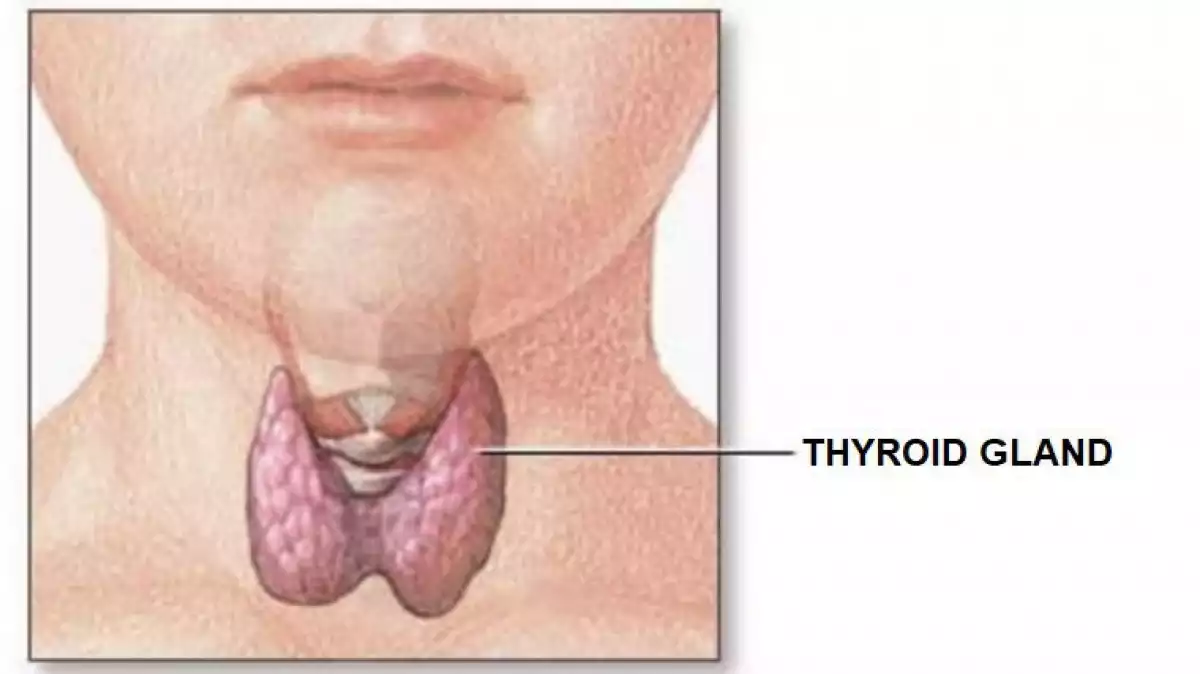The thyroid is a gland that belongs to the endocrine system, whose main function is the secretion of hormones, which regulate most of your physiology. Therefore, their excessive decrease or increase may lead to health problems, such as hyperthyroidism, hypothyroidism, goiter, Hashimoto’s thyroid disease and cancer. The following article will explain what the thyroid gland is as well as its function in the endocrine system. Moreover, we will go through the effects of thyroid hormones and the main symptoms of thyroid diseases.
The thyroid: An endocrine gland
In order to define the thyroid gland, let’s begin by describing its location in your body. So, it is located in the neck and is part of the endocrine system. The function of the endocrine system is to regulate different physiological responses, especially by releasing substances known as hormones. In order to do this, the endocrine system consists of small organs whose main function is to secrete these substances and release them into the bloodstream. These organs are called glands, which is why this system is also known as system of internal secretion glands.
Therefore, the thyroid is a gland that belongs to the endocrine system (it is one of the endocrine glands). In order to function, it communicates with other glands of the same system: the hypothalamus and the pituitary gland. It is so small that it does not usually weigh more than 20 grams; and therefore, it is not palpable. It is composed of two lobes which make it look like a butterfly.
At the back, it has four parathyroid glands that regulate the low levels of minerals such as calcium. It also communicates with the so called recurrent laryngeal nerves, whose function is to provide movement to the vocal cords. Besides, it is composed of different spherical groupings of cells called follicles.
The thyroid hormones
As it has been mentioned, the main function of endocrine glands, including the thyroid, is to produce and release hormones into the bloodstream. Namely, this gland secretes two types of thyroid hormones, which are called triiodothyronine (known as T3) and, to a greater extent, tetraiodothyronine (abbreviated as T4 and also known as thyroxine).
But, how are the thyroid hormones produced? The secretion of these substances is possible due to an amino acid that synthesises proteins, which is known as tyrosine. Besides, in order to produce these hormones, the thyroid needs a mineral called iodine. In fact, the latter is the main compound of both T3 and T4, which is why it is thought that the correct concentration of iodine in the organism is essential for the synthesis of thyroid hormones.
Finally, what is the role of thyroid hormones? These substances are the main responsible for most of the physiological activity of your organism. Therefore, its deficiency is related to different health problems. Among the main functions of these substances, there are:
Regulate the energy consumption (both at rest and during activity) and so, rise the body temperature
Increase the metabolism of cells, thus increasing the consumption of oxygen in all the organs
Regulate the heart rate
Help develop neurons (brain cells)
Make possible the development of cartilage, a connective tissue that covers the joints and so, provides movement to your musculoskeletal system
At an early age, the cartilage also helps the development of the bone system, and for adults, it helps the bone remodelling, for which the secretion of these hormones is essential
Stimulate the metabolism of fats and sugars.

Health problems and diseases
As mentioned before, the hormones produced by the thyroid gland have an important role in the physiological activity of your body. Therefore, both the deficiency and the excess of their secretion lead to different health problems. Due to their nature, these problems are considered endocrine diseases. Some of the most common ones are: hyperthyroidism, hypothyroidism, goiter and thyroid cancer. Next, we are going to explain the main symptoms and causes of each one of them.
1. Hypothyroidism: Symptoms and causes
Hypothyroidism is the disease caused by a deficiency in the production of thyroid hormones. This is why it is called “hypothyroidism”, since “hypo” means “lack of”. Besides, in the case of hypothyroidism, this decrease in the production of thyroid hormones means an increase in the levels of thyrotropic hormone, which is secreted by the pituitary. Since it is characterised by a deficiency of T3 and T4, some of the main hypothyroidism symptoms are:
Low body temperature, cold skin and feeling constantly cold
Slow heart rate
Increase in the cholesterol level, especially the "bad cholesterol" type, due to a deficiency in the metabolism of fats and sugars, which may increase the predisposition to diabetes
Lethargy: drowsiness or excessive tiredness
Constipation
Muscle contracture
Menorrhagia, also known as breakthrough bleeding or vaginal bleeding. This is a vaginal bleeding that does not happen during the menstrual period.
2. Hyperthyroidism: Symptoms and causes
Unlike hypothyroidism, hyperthyroidism is an endocrine disease characterized by an excess in the production of thyroid hormones. This is why it is called “hyperthyroidism”, since “hyper” suggests “excess of”. The main causes of this disease are goiter, excessive production of thyroid nodules, inflammation of the thyroid, and the side effects of some medication. Since the thyroid gland produces an excessive amount of T3 and T4 hormones, some of the main hyperthyroidism symptoms are:
Heart racing: abnormally rapid heart rate with intense pumps
Low levels of cholesterol as a result of overstimulated metabolism of fats and sugars
Weight loss, but increase of appetite
Fatigue and muscular weakness
Constant shaking
Nervousness: predisposition to panic
Heat intolerance, due to a sensation of constant increase of body temperature
All of the above are related to irritability and anxiety, as well as to trouble sleeping
3. Goiter: Symptoms and causes
Goiter is a medical condition characterized by a significant enlargement of the thyroid gland. Although the thyroid is not usually visible, depending on the type of goiter, this gland turns into a tumour at the base of the neck. It may be caused due to an improper functioning of the thyroid or to a significant swelling of the gland. Although in many cases the cause is unknown, goiter is usually associated with iodine deficiency, which is known as endemic goiter.
Besides, both iodine deficiency and an excessive enlargement may stimulate the production of carcinomas (tumours that are cancerous) in different parts of this gland. It can also be caused by the consumption of different goitrogenic substances, like some drugs or some substances found in water, among others. The treatment consists mainly in drugs that regulate the levels of thyroid hormones.
4. Thyroid cancer: Symptoms and causes
Thyroid cancer is the most common disease of the endocrine system. It is more likely to affect women between the ages of 25 and 55, and its main cause is the development of endemic goiter. It may also be caused due to excessive exposure to external radiation of the head or neck.
The two main types of thyroid cancer, depending on the tumour, are: papillary thyroid cancer (when it produces thyroid nodules) and anaplastic thyroid cancer (when the tissue is completely invaded). The first is the most common one and has a more favourable prognosis than the second one.
5. Hashimoto's thyroid disease: Symptoms and causes
Hashimoto thyroid disease is also known as Hashimoto’s Thyroiditis thanks to the doctor who described it for the first time at the beginning of the 20th century. Its original name was chronic lymphocytic thyroiditis, since it is characterized by an increase in the size of the thyroid gland, which is related to the activity of lymphocytes (a type of white blood cells, whose function is to protect the organism).
In this case, the improper functioning of the thyroid gland is the result of an autoimmune disease. That is to say, it is a disease caused by the immune system: the immune cells attack healthy thyroid tissue. The main consequence of Hashimoto's thyroid disease is goiter and the development of hypothyroidism, although it usually occurs along with other health problems, such as celiac disease.

Treatment and thyroid medication
Since it has been discovered that iodine deficiency decreases the secretion of thyroid hormones, the World Health Organization has recommended the addition of iodine supplements to foods of the basic diet, for example, bread, milk or cereals. Likewise, the drug treatment used for both hypothyroidism and goiter (and therefore for Hashimoto's thyroid disease) consists in administrating levothyroxine.
This is a drug manufactured from a synthetic substance that has the same effect as thyroxine (tetraiodothyronine or T4). When it is absorbed by the organism, the levothyroxine increases the production of T3, and so it helps regulate the secretion of both thyroid hormones. Finally, when thyroid cancer is detected, a thyroidectomy can also be performed, which is a surgery to remove the malignant tumour. This is combined with the palliative treatments that are common in all types of cancer.
- This article about "The Thyroid" was originally published in Spanish in Viviendo La Salud
References:
Cremer, G. (2011) Doctor, ¿es la tiroides?. Editorial Hispano Europea: España
Meglioli, V. (2012). Tiroides: cómo prevenir y curar sus afecciones. Ediciones Obelisco: Barcelona
Rey Nodar, S (2012). Patología de la glándula de la tiroides. Texto y Atlas. Fundación TEDECA: España
